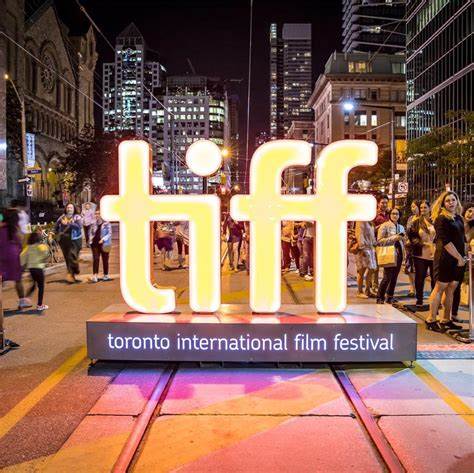 by Cheryl Eagan-Donovan
by Cheryl Eagan-Donovan
(with apologies on the very late posting of this story)
I arrived late Friday night after a delay in Boston because of thunderstorms. Saturday morning I walked from the Chelsea Hotel on Gerrard Street to John Street, the festival hub, where several blocks were closed to traffic during the weekend, creating a pedestrian mall with vendors, food, and live music. This was my first Toronto International Film Festival, and I was impressed with the size and scope – it reminded me a bit of SXSW. Purchasing tickets online in advance was challenging; big names and premieres sold out immediately which meant that I would not likely be able to get into some of the screenings I had hoped to attend. So I stood in line for 45 minutes Saturday morning to try and get standby tickets to The Boy and the Heron but no luck. I went next to Starbucks for iced coffee and a spinach wrap and then got in line for the first film I had a ticket for, Summer Qamp, the first feature-length documentary from director Jen Markowitz. Shot in Alberta, Canada, the film focuses on a camp for queer, trans, and non-binary kids. This was the film’s premiere so the crew, the cast of campers, their friends and families were all in attendance, which made it a very festive event. The film is charming and moving, with some great intimate moments, including scenes where one trans teen comes out to his mother on the phone, and another where an introverted camper makes a new best friend. In the Q&A, the team talked about the importance of having an all- queer film crew, so that the kids felt free to be themselves and this is a strength of the film; it achieves an authenticity that approaches cinema verite. In the last scene, when the campers say goodbye, the viewer feels the same bittersweet joy as the kids do.
My next stop was the standby line for Pedro Almodovar’s short film Strange Way of Life starring Ethan Hawke and Pedro Pascal, to be followed by a conversation with the director in person. I had tried multiple times to procure tickets for this event but again to no avail. Almodovar is one of my favorite directors; I discovered his early films Law of Desire and Matador in the 1980s and have followed his work ever since. I was standing in line with three guys from LA who were waiting to get into The Convert by famed New Zealand director Lee Tamahori, and I had an opportunity to see that instead when some seats opened up, but I opted to stay in line to see Almodovar. After about 90 minutes, they had reached capacity for the screening, cutting off the line three people ahead of me. I went upstairs to the lobby to wait with a few other diehard fans to see the director walk from the greenroom to theater, and then back again after the event. Two guys I was waiting with had photos they hoped to have signed but he did not stop or even acknowledge us, despite my attempt to get his attention by yelling “Pedro, te amo!”
I did manage to get advance tickets for the world premiere of American Fiction, which I absolutely loved and recognized right away as Oscar bait. In spite of the recent Golden Globes snub, I stand by my early prediction that this film will resonate with both audiences and the Academy. As a writer and a college professor, I loved the opening sequence, where the main character challenges a student and then promptly gets told to take a “vacation”. The premise and execution are excellent: a biting satire about the book industry and Hollywood, in some ways reminiscent of a Jordan Peele’s work but less obscure, more accessible, and very funny. It features an outstanding cast including Jeffrey Wright in the lead role as Monk, Sterling K. Brown as his brother, Tracy Ellis Ross as his sister, and Issa Rae as a rival writer. For me, the genius of the film is the way it fuses this scathing attack on the publishing world and book lovers alike with a realistic and moving family drama. It was shot in Massachusetts, with Mike Bowles acting as a producer, from whom we learned at a recent IFFBoston screening that the script was originally set in New York City. Of course the story would work in Manhattan as well, but for the local film community it was a great coupe to land this production in addition to Alexander Payne’s award-winning The Holdovers. The TIFF audience laughed out loud throughout the screening (as viewers did at the Brattle Theatre in Cambridge) and director Cord Jefferson was clearly overwhelmed by the response in the post screening Q&A. He began by saying one word: gratitude. This is his first feature film, although he has lots of TV credits, and he acknowledged that on a panel with Lulu Wang, she had shared this rule for directors: if you are tired, frustrated, feeling like it’s impossible, be grateful. He talked about the meta reality and the inevitable “commodification” of the film. “Selling the film is the least fun part” he said, but to see an audience filled with people who love movies enjoy the film so much was the “greatest honor” of his life.
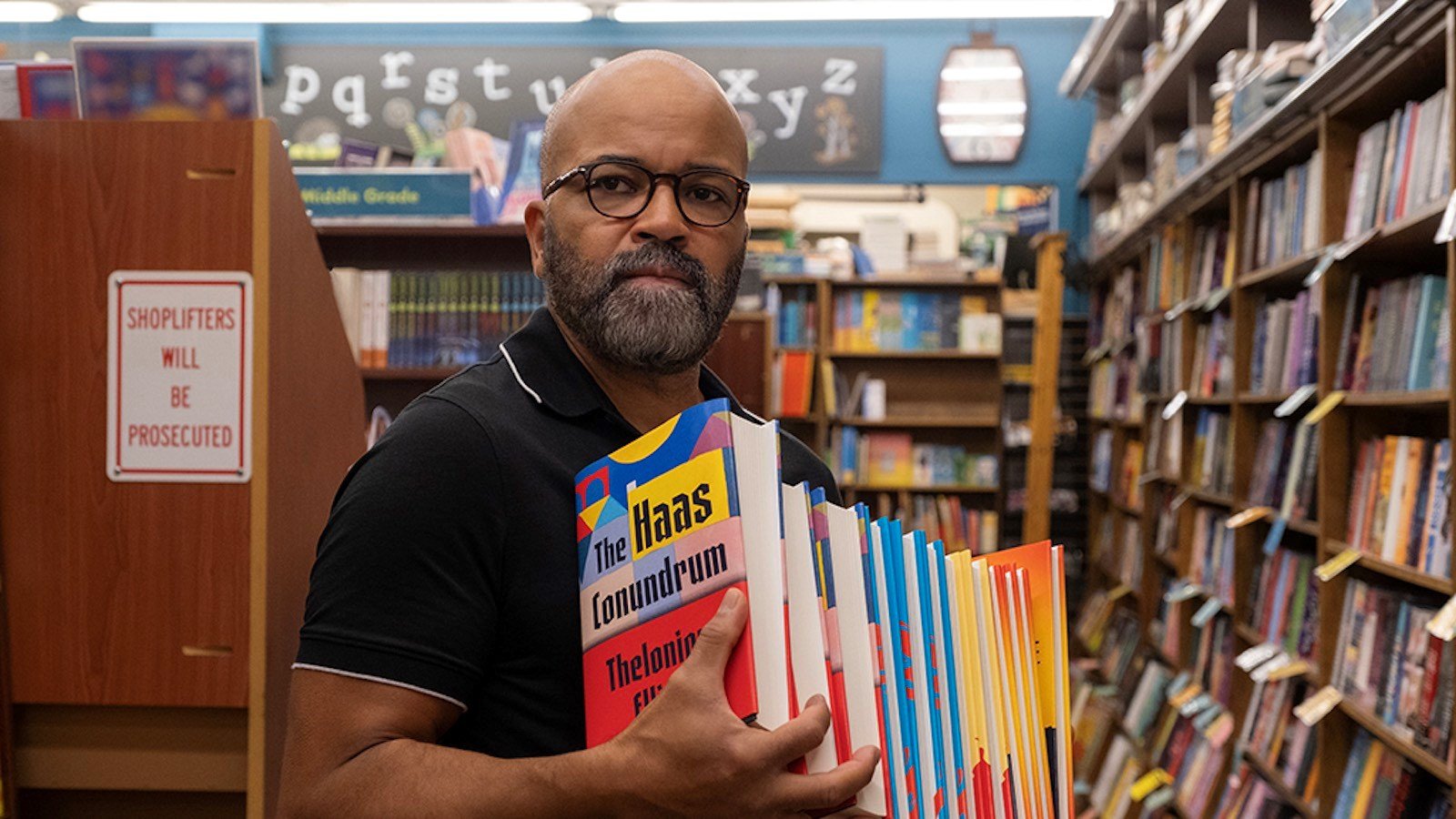
After a quick snack from the concessions stand, I went to see my next scheduled film, Queen of My Dreams, a great first feature that mixes Bollywood with a traditional mother/daughter drama. Director Fawzia Mirza was clearly influenced by the brilliant Gundira Chandra film Bend It Like Beckham in this story of a young woman determined to rebel against traditional gender roles. Based on a short by Mirza, the film weaves together the parallel stories of mother and daughter, in a way that is both structurally innovative and cinematic. This is a new director to watch – it will be exciting to see what she does next.
My last film of the day was another big name premiere, which I did manage to get an advance ticket for: Lil Nas X; Long Live Montero. I had a good seat in the balcony of the largest festival venue, the 2,630-seat Roy A. Thompson Concert Hall. Sitting next to me were two students and we shared our stories of trying to get tickets online and then we wondered why they were so late starting the film. One thing I discovered about Toronto was that, unlike other festivals, they start every film on time and only seat standbys after the first 15-20 minutes has played. This means that after waiting for an hour or more you also miss the opening of the film. We decided the premiere was probably delayed because there was a huge crowd outside waiting to see Lil Nas X arrive. He walked the red carpet with his entourage including the directors and his father, whose unconditional love and support he clearly thrives on. The film is an intimate look into a critical moment in the artist’s development. Editor Andrew Morrow did a great job of balancing concert footage with behind-the scenes glimpses of Lil Nas X backstage, at home alone, and with his family, highlighting his relationships with his creative team and his father, brothers, stepmother, and nephew. During the screening, the audience sang along and cheered for every performance. It was like being at a series of live concerts, with a narrative that follows the Long Live Montero tour to a different city each day: San Francisco, New York, his hometown Atlanta, and Boston, where protesters picketed his show at the TD Garden so he bought them pizza, “pineapple pizza”, he explained laughing. The story showcases just how fierce and fearless Lil Nas X is. He charmed the audience during the post screening Q&A, posing in a fabulous purple satin suit, making clever jokes, and explaining his vision for the film as a “journey to find out who you really are and to expressing yourself with bravery in times of prejudice”. It wasn’t until Sunday morning that I read in Variety and then heard on the local news that 30-minute delay was the result of a bomb threat that was called in to the theater by someone who referenced the fact that Lil Nas X is black and queer.
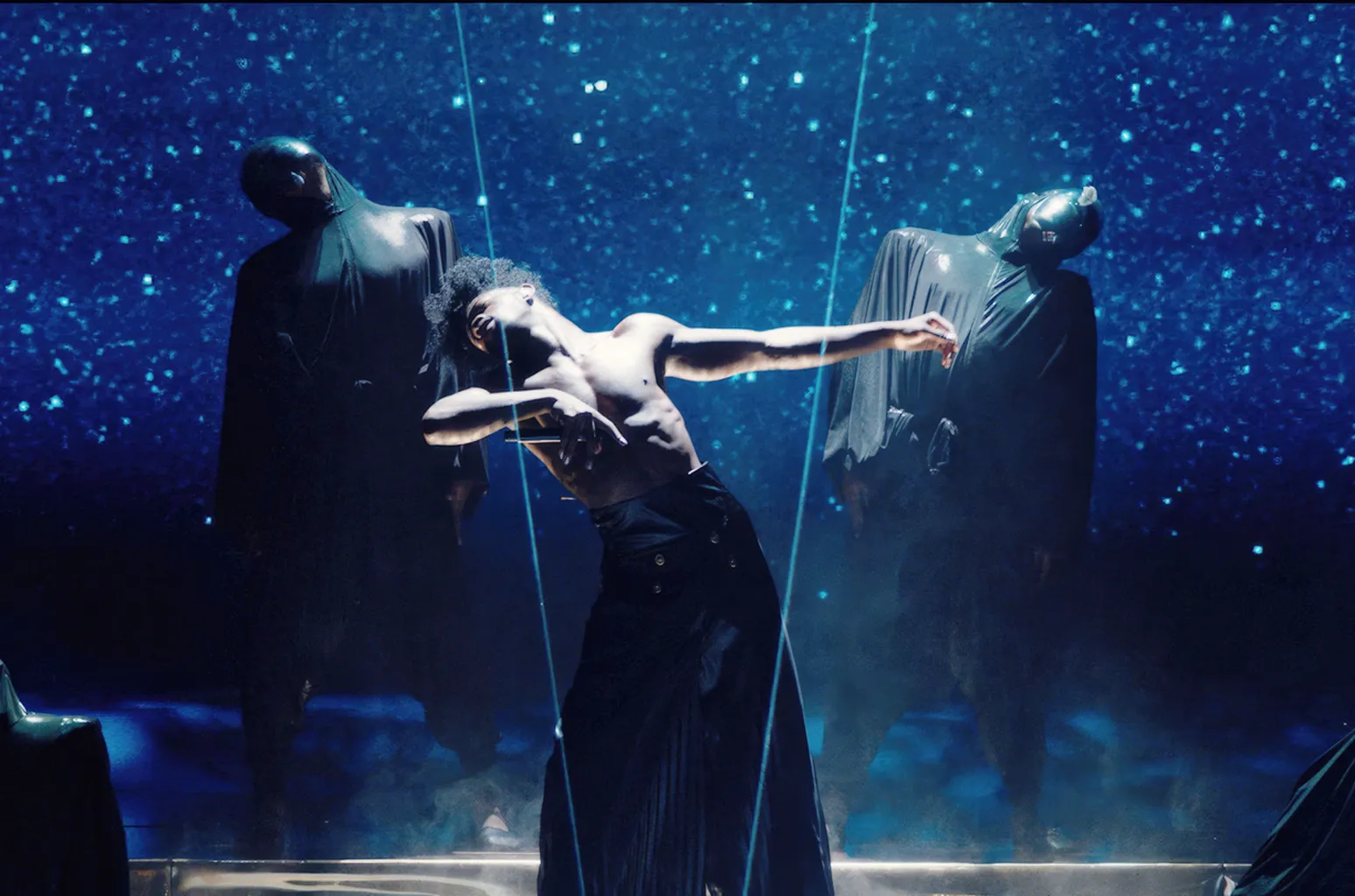
Sunday morning, instead of waiting in line again for The Boy and the Heron, I decided to standby for Dumb Money, based on the book The Anti-Social Network by Ben Mezrich. It turned out to be a good choice because I heard later that only 30 people from the rush line for Miyazaki’s film were admitted. I missed the first twenty minutes of the film, and I have to admit that my first impression was that this was a “dumb” movie. Pete Davidson plays a loser Door Dash driver, whose brother, played by Paul Dano, is the Game Stop guru, and the film is set in Boston and Brockton, where the brothers lived. The music was loud and obnoxious, and the first act of the film had a Wolf of Wall Street vibe, especially the gratuitous party game scene: just stupid and sexist. But the main character is compelling, even if the investors are a little clichéd, and the overall style with the onscreen graphics, music choices, and frat boy jokes set the tone. Dumb Money is clearly intended to appeal to a certain demographic not unlike the thirty-something guys and women from LA I had stood in line with. They had a film in the festival but were obnoxious, joking about O.J., Chris Rock, and making offensive remarks about women, which they thought were funny. In some ways the narrative structure is quite similar to another Mezrich adaptation, The Social Network, and it is a fascinating story, but without the talents of Aaron Sorkin, David Fincher, Trent Reznor and Atticus Ross, it fails to deliver a substantial return on investment.
It was a beautiful day so I decided to take a break and go to the Blue Jays game. I had never been to the Rogers Centre stadium and was able to get an inexpensive ticket. It’s a great park with live music acts playing during the game, lots of different viewing platforms and lounge spaces, and great pizza. My next film was Concrete Utopia, by Korean director Um Tae-hwa, a dystopian tale about a post-apocalyptic apartment building and the violent de-evolution of the people fighting for survival inside and out of the concrete world. I would like to have stayed for the Q&A but I just made to the Scotia Bank venue in time for the next film, One Life. In contrast to the nihilism of Tae-hwa’s vision, this film offered audiences some hope for the future of humanity. The film features an emotionally powerful performance by Anthony Hopkins as Sir Nicky Winton, a British broker who saved 669 Jewish children living in Prague from the Nazis during World War II, and as a result, changed history. The film succeeds with excellent performances by Hopkins, Helena Bonham Carter, and Jonathan Pryce, and top-quality production value from cinematographer Zac Nicholson and editor Lucia Zuchetti. The story ends with Winton reluctantly meeting of one of the women he saved and her daughter. But what made this screening exceptional was the audience, which included 40 survivors and their descendents at the world premiere, living proof of the impact that one person can have. At the Q&A, Director James Hawes talked about the intersection of history, truth, and censorship. One Life is another example of the power of film.
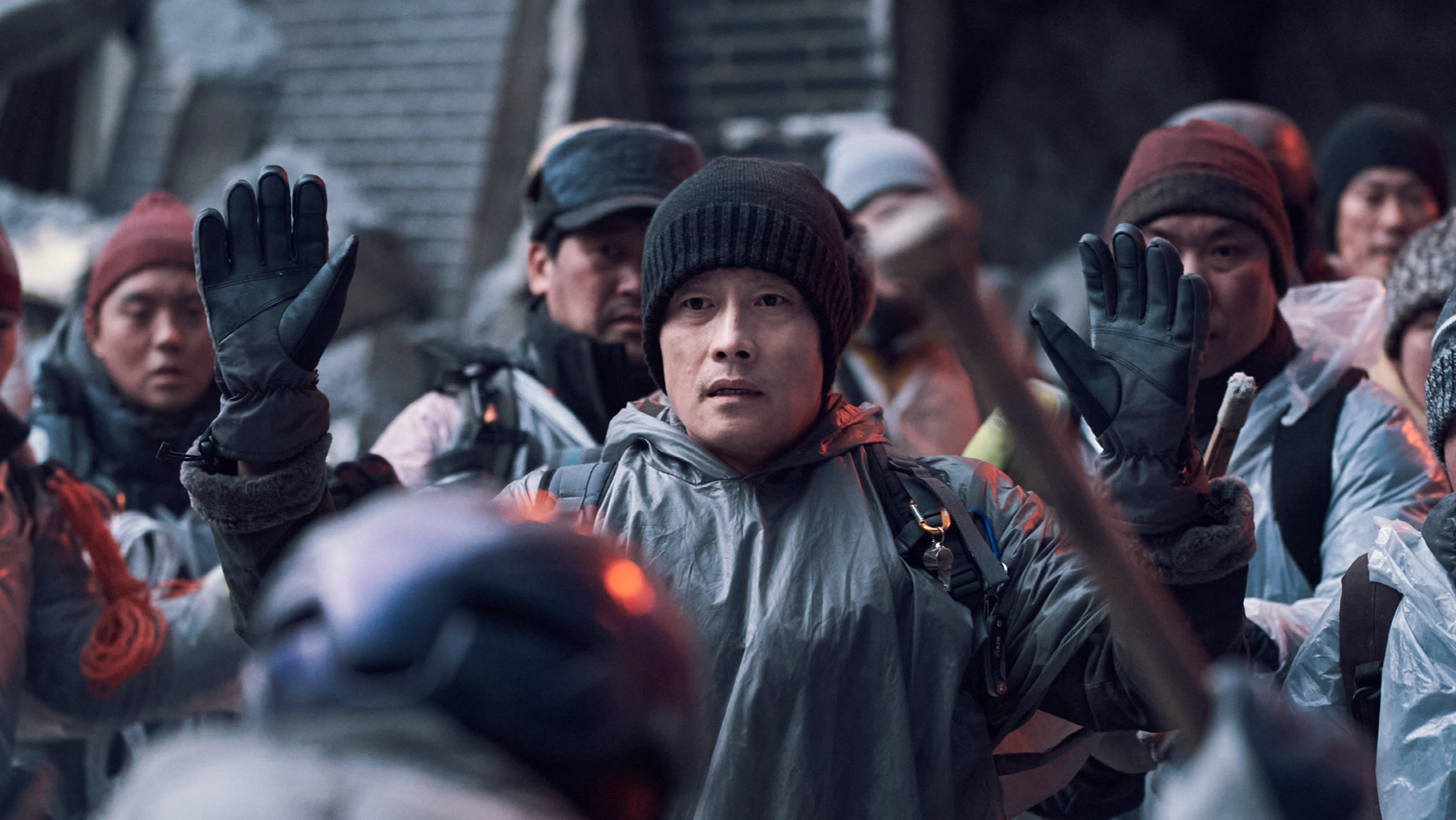
On Monday, I was very much looking forward to The Pigeon Tunnel, the documentary based on John LeCarre’s memoir and directed by the great Errol Morris. I have long loved LeCarre’s work for the exquisite way he crafts his characters and imbues them with truly complex psychological realism. His characters come close to the level of Shakespeare’s and the fact that he used a pseudonym and drew extensively from his own life experience, relentless exploring his own psyche and trauma, makes the comparison that much more intriguing. The author’s father, a notorious con man, was a great source of much of what he wrote about. Le Carre’s two sons, Simon and Steven, are producers on the film, and at the Q&A, they talked about continuing their father’s work by adapting other novels for the screen. The extraordinary thing about The Pigeon Tunnel is that it brings together these two accomplished artists. His producer sons described the film as a “uniquely intimate conversation, very true to [LeCarre’s] exploration of life”. They explained that Morris and their father are “both great creators of story and fable in a complex world” with a ”shared perspective”. They also said that their father was very wary and suspicious of the process and that it resulted in a long dance before the two men met in a great hall and sized one another up. This becomes a very effective opening of the film when LeCarre turns the tables on the director and asks him, “Who are you?’ The film then unfolds exactly like a LeCarre spy novel, exploring the psychological depths of one man’s extraordinary journey to discover meaning in his own life through themes of betrayal, memory, family, and history. This is visually brought to life through the use of mirrors, skewed angles, clips from film adaptations of the novels, and the repeated motif of the pigeons, and further enhanced with a score by Philip Glass.
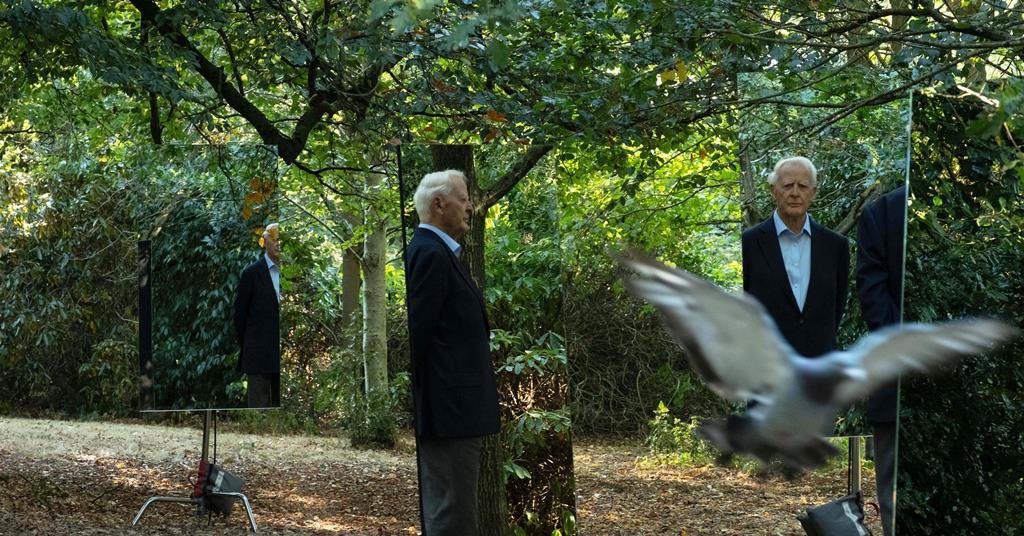
Morris described the wealth of LeCarre’s material as “a tsunami of words” in over 30 novels. Talking about theme of father/son relationships, Morris shared that his father had died when he was two years old. He said it is very rare to have the opportunity to talk about history and personality (the two spent a total of four days talking on camera) with someone like LeCarre who he compared to Kafka, a writer also loved parables, which the title incident functions as. The film is a brilliant portrait of a great writer. His sons are committed to continuing their father’s legacy, with plans to release a half dozen more adaptations which they worked with him on during the last ten years of his life, including The Spy Who Came In from the Cold and the Smiley series. Morris then asked the brothers if they had considered adapting The Pigeon Tunnel again, this time as a narrative feature film, and when they admitted it was a possibility, Morris quipped, “Just as I feared!” But he needn’t worry; the documentary stands out as yet another Errol Morris masterpiece, on a par with its subject.
That evening I caught a glimpse of Ethan Hawke on the red carpet before the screening of Wildcat, starring his daughter Maya as Flannery O’Connor. The actor and cast were some the few who had been granted permission to promote their film at the festival during the writers’ strike. The film, directed by Ethan and also starring Laura Linney, is a compelling look at the life of a writer searching for meaning in her work. Maya explained in the Q&A that O’Connor was “a very lonely person – writing is a lonely activity – and she wanted to do something unique.” Ethan also co-wrote the script and together he and Maya explained how they tried to match the razor-sharp, deliberate precision that O’Connor employed in her short stories and novels, with the way they shot the film. I learned a lot about O’Connor’s life and career from this biopic but it failed to capture the world of a writer in the vivid way that Morris’ doc did.
On Tuesday, I had to stand in line for Rustin even though I had a ticket but it was worth the wait. Coleman Domingo gives an Oscar-caliber performance as the openly gay activist and civil rights organizer. The film builds to the climax of the 1963 March on Washington, where Dr. Martin Luther King delivered his now famous speech, revealing and celebrating Bayard Rustin as the mastermind behind the event, whose perseverance and political savvy made this historic moment possible against seemingly insurmountable odds. The story unfolds within the perfect narrative structure for a traditional screenplay, highlighting Rustin’s determination despite constant attacks on him because of his openness about his sexuality. He refused to be bullied into the closet, even by the most powerful leaders in Washington and Dr. King himself. Like most geniuses, he is also shown as obsessed with work and bad at managing personal relationships. A fabulous score by Branford Marsalis propels the film forward. Director George C. Wolfe spoke about the fact that most people don’t even know who Bayard Rustin is, an example of erasure from history, but said that his hope is that the film will inspire new generations of viewers to become activists. A student in the audience asked, “What advice do you have for an aspiring filmmaker?” Wolfe replied, “Be ferocious, never accept ‘no’, build a team of collaborators you can trust and work with. If they are assholes, walk away, and protect your work like a fragile baby.” Sound advice. This is the first big feature for Barack and Michelle Obama’s Higher Ground production company, and the screening was preceded by a message from the 44th president. It is both an important educational film that I will show to my students and another clear awards season contender.
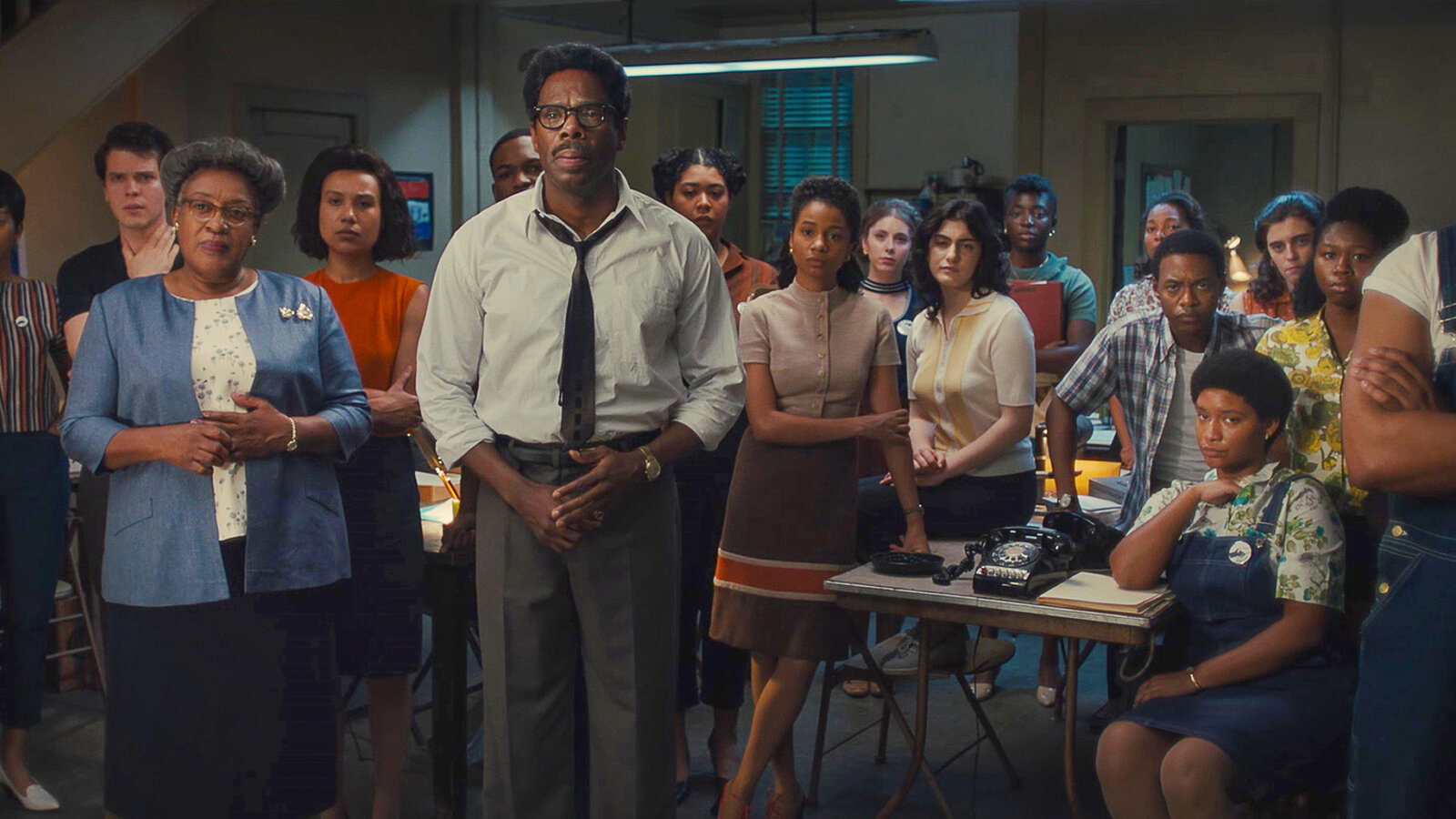
It was my last night in Toronto and I finally caught up with fellow Chlotrudis members Michael Colford and Chris Kriofske. We had dinner at the Canteen Restaurant outside the Bell Lighthouse theater complex, headquarters for the festival. It was my first proper meal since arriving Friday night, and we joked about subsisting on a diet of popcorn, candy, beer and wine. We also compared notes on the films we had seen. Atom Egoyan’s production assistant was supposed to join us but was she not able to make it, so at 8 p.m. we went our separate ways to see our last films for the day. I had chosen Viva Varda, screening upstairs at the Bell Lighthouse complex, where the top floor features a new Varda Lounge. Unfortunately, the film was a real disappointment; the first bad film in what was an otherwise stellar lineup. The documentary, which purported to be the definitive story of the life and work of groundbreaking director Agnes Varda, simply recycled footage from her own films, including autobiographical materials she had filmed and directed. It added no new insights into her craft and creativity, or her personal life, despite her children’s best intentions. The director came across in the Q&A as a pompous bore and so did the film. Thankfully it was only 90 minutes long.
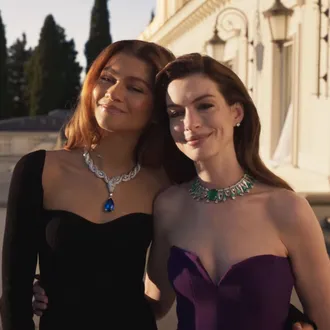
Toronto is a great festival: the venues are close enough so that it’s easy to get from one film to the next, and although it’s difficult to get premium tickets in advance, I would definitely attend again. The audiences are enthusiastic, clapping along in unison to the Bulgari ad featuring Anne Hathaway and Zendaya (no idea why) and when the piracy warning appears on screen, they all yell, “Arrrrgh!” One thing I missed was the concurrent film conference, which included talks by Spike Lee and Lulu Wang, so on my next visit, I will purchase a conference pass. I headed back to Boston on Wednesday morning but was glad to hear that American Fiction had won the TIFF 2023 People’s Choice Award. Thanks again to the Chlotrudis Society for Independent Film for supporting the festival!
